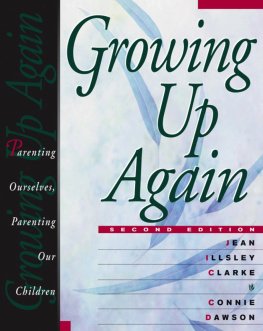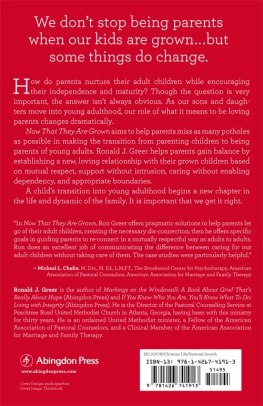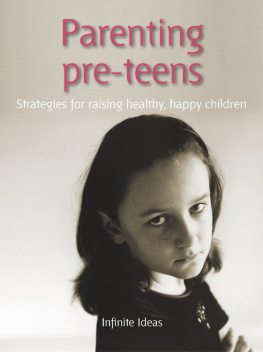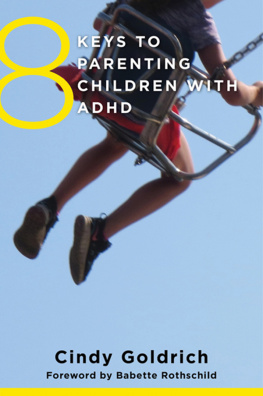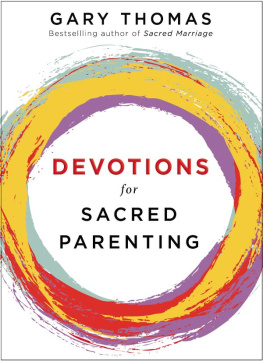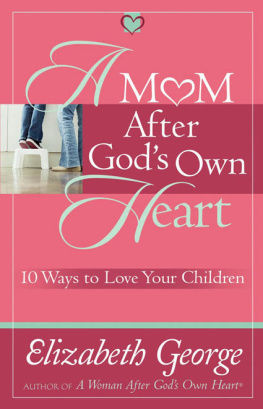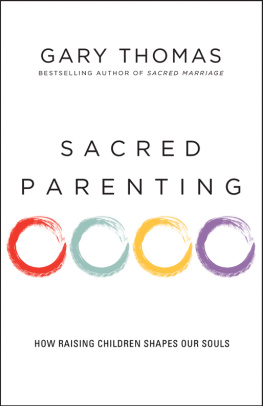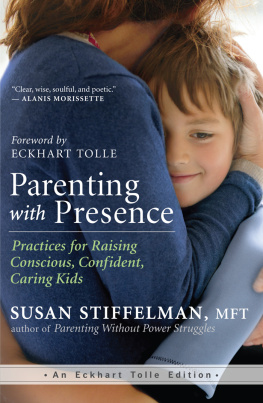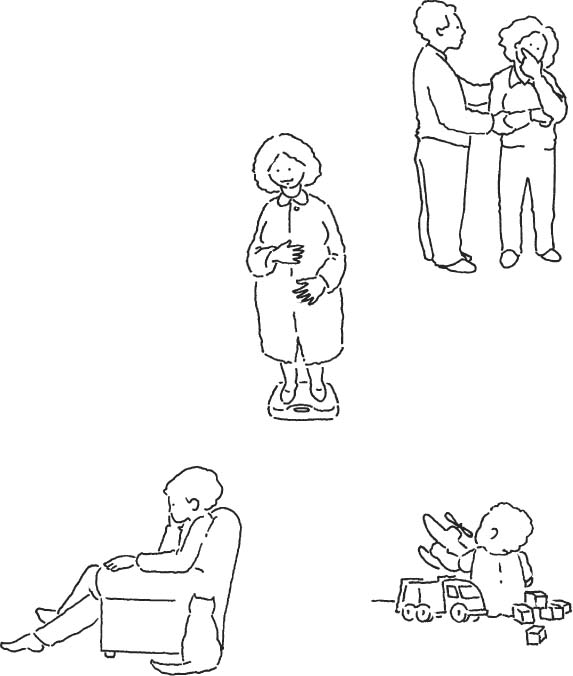Growing
Up
Again
Parenting Ourselves,
Parenting Our Children
JEAN ILLSLEY CLARKE
and
CONNIE DAWSON
Second Edition

Hazelden Publishing
Center City, Minnesota 55012-0176
800-328-9000
hazelden.org/bookstore
1989, 1998 by Jean Illsley Clarke and Connie Dawson
All rights reserved. First published 1989. Second edition 1998
Printed in the United States of America
No portion of this publication may be reproduced in any manner without the written permission of the publisher, except the Nurture Chart, Structure Chart, Discounting Charts, Double-Bind Chart, Problem-Solving Worksheet, and affirmation ovals on pages 218242all of which are reproducible for educational purposes.
Library of Congress Cataloging-in-Publication Data
Clarke, Jean Illsley.
Growing up again : parenting ourselves, parenting our children / Jean Illsley Clarke and Connie Dawson. 2nd ed.
p. cm.
ISBN 1-56838-190-5
Ebook ISBN: 978-1-59285-803-3
1. Parenting. I. Dawson, Connie. II. Title.
HQ755.8.C55 1998
649'.1dc21 97-48978
CIP
Editors note
Hazelden offers a variety of information on chemical dependency and related areas. Our publications do not necessarily represent Hazeldens programs, nor do they officially speak for any Twelve Step organization.
All the stories in this book are based on actual experiences. The names and details have been changed to protect the privacy of the people involved. In some cases, composites have been created.
12 11 10 09 08 15 14 13 12 11
Book design by Will H. Powers
Illustrations by David Spohn
Cover design by David Spohn
Typesetting by Stanton Publication Services, Inc.
We dedicate this book to our children and their children, for being who they are, and for inadvertently pushing us to figure out our lives.
Contents
Nurture Chart
Structure Chart
Alternatives to Overindulging Chart
Discounting Chart 1
Stop Discounting, Chart 2
Double-Bind Discounting, Chart 3
Problem-Solving Worksheet
Prenatal (Becoming): Conception to Birth
Stage 1 (Being): Birth to Six Month
Stage 2 (Doing): Six Months to Eighteen Months
Stage 3 (Thinking): Eighteen Months to Three Years
Stage 4 (Identity and Power): Three Years to Six Years
Stage 5 (Structure): Six Years to Twelve Years
Stage 6 (Identity, Sexuality, and Separation): Twelve Years to Nineteen Years
Stage 7 (Interdependence): Adults
Stage 8 (Integration): Toward Death
Adoption Developmental Chart
Even and Uneven Parenting
Using Contracts
Sample Rules Chart
Getting Free of Double Binds
Encouraging Responsibility through Language
Supporting Spiritual Growth through the Early Developmental Stages
Developmental Affirmations: How to Use Them with Your Family and Yourself
Seeing Our Own Shields: A Visualization
Where to Go for Additional Help
Preface
When trade publisher Dan Odegard called to say that Hazelden wanted a new edition of Growing Up Again, he asked if we authors had anything new we wanted to say. The answer was an immediate yes.
Connie had pursued her study of adoption and the many ways that it demands special parenting. Jean and Dr. David Bredehoft had completed their research on overindulgence, that confounding phenomenon that seems to be more and more widespread.
Recent births and the deaths of friends and relatives have pushed us to expand the Ages and Stages section of the book: astounding research about the significance of the prenatal experience needs to be considered, and the end of life, whether it arrives in later years or follows an illness during an earlier decade, are unique stages of life and need to be recognized as such.
Our colleague Jim Jump suggested the metaphor of the highway as a way of thinking about the nurturing and structuring behaviors. We have expanded that idea into a graphic representation that helps parents recognize not only daily habits of caring for themselves and others, but also intergenerational patterns of parenting that they may wish to keep or change.
The second edition of Growing Up Again includes new examples of nurture, structure, and discounting and a concise way to identify those behaviors in solving a vexing problem.
We also give direct attention to the human hungers for stimulation, recognition, and certainty and how the need to satisfy those hungers can sometimes show up in confusing ways. Recognizing the potency of the hungers can help unravel the cause of puzzling behaviors.
Growing Up Again readers have added richness to the book with their contributions. Barbara Beystrom offered the helps for handling parenting conflicts in merging families. Sandy Keiser urged us to include charts on denial and double binds and submitted prototypes. Mary Kaye Ashley responded to the request for guidelines on supporting children's spiritual growth.
So we have expanded what Gaye Hurtig calls the helpful landscape of growing up again. Here it isnew help for the all-important challenge of parenting our children and helping ourselves grow up again. Make it yours.
Connie and Jean
Acknowledgments
We thank the many people who have offered their thinking and support for the new version of this book, especially Joan Comeau, Susannah Temple, Eveline Goodall, Drew Betz, Ruth Harms, Carole Gesme, Sandy Keiser, Deane Gradous, Cally Fuchs, and Lu Soley.
We are grateful to the people who willingly made contributions to the various new sections of the book.
Deep thanks to Laurie Kanyer, Kathie Arcide, Sandy Keiser, Millie Dash, Elaine Childs-Gowell, Marcy Wineman Axness, Russell Osnes, Jeanne Wiger, Susan Clarke, Ruth and Ken Lough, and Patricia Allen for drawing on their experience to provide information for the prenatal Becoming chart.
For sharing their experiences and sound thinking on the foster and adoptive parenting chapter, Connie thanks Alyce Mitchem Jenkins, Marcy Wineman Axness, Mary and Terry Paananen, Myrth Ogilvie, Jeff, Laurie and Jake Dagenhart, Mark Henningsen, Dennis Thoennes, Ph.D., Tom Matlock, Sherrie Eldridge, Christine Ternand, M.D., Diana York, Barbara Beystrom, Shirley Bullock, Sandy Keiser, Eleanor McFarlane, Darlene Fairbanks, Marilyn Sackariason, Mahima Price, the hundreds of workshop and class participants and the attachment therapists and therapeutic foster families in Evergreen, Colorado. Special thanks to Jean Paton and Betty Jean Lifton for their contributions and mentorship.
The writing of the section on Death, the Stage of Integration, coincided with the deaths of friends Joe Lawrence and Joe McFarlane, who taught us about the meaning of life through their dying, and their wives, Maggie and Eleanor, who helped us understand the journey. Thanks to the Crone Circle of Evergreen, Colorado. The thoughtfulness of an indomitable group of crones from many places, most particularly Ruth Robinson, Nancy Parsons-Craft, Barbara Sternberg, Anne Anselment, Delphine Bowers, Shauna Adix, Susan Ann Stauffer, Ruth Lough, and Elders Dick Lundy, Russell Osnes, and Ken Lough is much appreciated.

